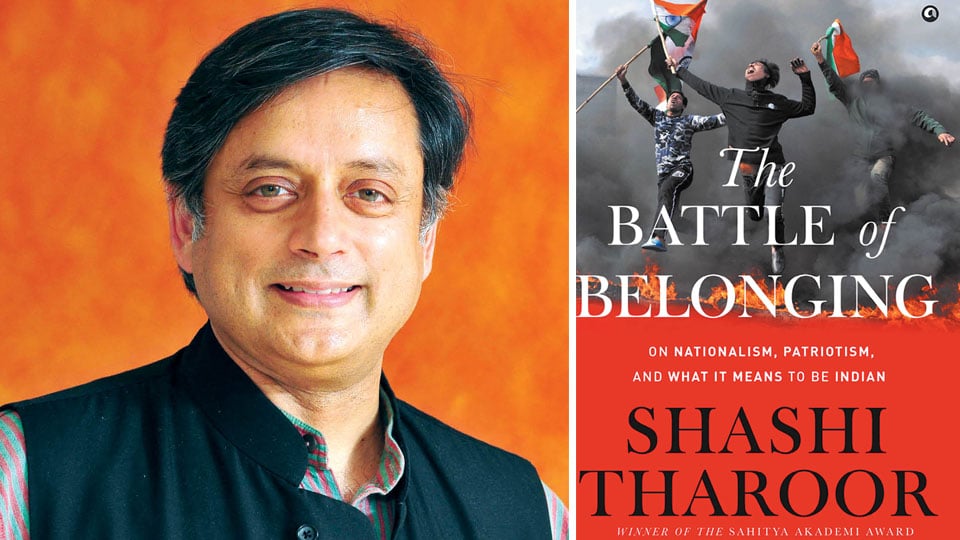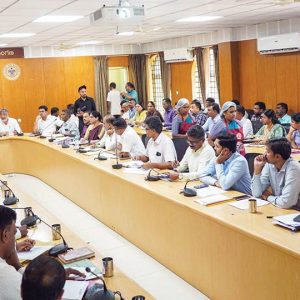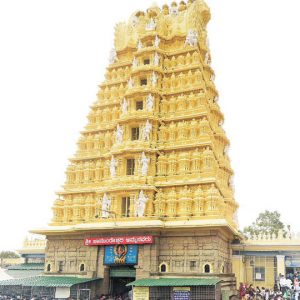By T.J.S. George
Shashi Tharoor seems to be a non-stop writing machine. He is a busy man — Member of Parliament, in-demand public speaker, international traveller and what not. In the midst of all that, he finds the time and the energy to turn out not just any book, but thick volumes full of research and analysis. The latest is typical. Its main title itself suggests a sweeping canvass: “The Battle of Belonging.” The subtitle brings out the scope of the extended survey: “On nationalism, patriotism and what it means to be Indian.” Handsomely published by Aleph, the book is 408 pages thick, not counting the 25-page long bibliography and a dozen pages of index. How does he achieve this when mundane scribblers like me sweat it out for months to complete a 200-page pretence of a book.
He covers everything, from basics like what is a nation and how the concepts of nationalism emerged, to how Subramania Bharati enriched nationalism and how the idea of India is under threat today from those who seek not just to rule India but also to change India. He himself is an unusual example of a nationalist. Born in Britain, he was entitled to a British passport. But he never applied for one.
That is where he distinguishes himself compared to people like me. Long years of travel left me regretting that I had an Indian passport. Immigration offices across the world had contempt for Indian passport holders. They saw Indians as citizenship-seekers or as people ready to break laws in order to make a living. Numerous are the times I felt humiliated at foreign immigration counters. Those were occasions when I regretted not getting a foreign passport when I could. The battle of belonging that people like Shashi Tharoor have to fight is a battle they can win. Ordinary citizens can never win such a battle.
Tharoor brings out the crux of the problem in a sentence that goes like this: “The British writer David Goodhart has interestingly argued that in the global battle between the ‘anywheres’ (cosmopolitans comfortable anywhere in the world, flitting between business-class lounges and five-star hotels, the votaries of globalisation who thought of themselves as citizens of the world) and the ‘somewheres’ (those rooted in a place, a land, an ethnicity, a religion, and local assumptions and traditional prejudices), the ‘somewheres’ had won.”
Tharoor dwells on a subtle point that made British colonialism a failure because it was fundamentally racist while French colonialism was a relative success because it had no trace of racism in it. A British writer, curious about an impeccably dressed black African in his flight, asked where the African was from and was told: “Me? I am French.” Not even the most favoured Indian maharajah would have thought of saying: “Me? I’am British.” The French had colonies but they were never seen as racially inclined snobs.
Is nationalism a negative sentiment in contrast to patriotism which is largely positive? Tharoor lines up a string of quotations to show how different people looked at this question from different angles. He opens up for us a world of thought where multiple interpretations are available to the reader on a one-touch basis as it were.
On the face of it, nationalism is in clash with what has become known as globalisation. So how do we reconcile with both? Leaders of the French Revolution held the view that the Rights of Man that they declared were valid for all people everywhere. They swore by “the ability of nationalism and religion, alone among all forms of allegiance, to give moral sanction to martyrdom and violence.”
Ideologically Tharoor of course is inclined against the BJP. He draws attention to the BJP’s “propping up of an idealised leader,” the increasing autocracy under its rule and the “overt demonisation” of Muslims who are “delegitimised as a treacherous permanent foreign element amidst ‘true’ Indians.” The use of questionable means in the BJP’s “quest for absolute power” is seen as a “departure from the idea of India celebrated by Tagore, achieved by Gandhi and implemented by Nehru and his comrades.”
It is not easy to fault Tharoor’s intellectualised analysis of the problems he handles. He brings in a touch of logic and gets it backed by an array of authorities and authors he quotes from. That almost every page has footnotes referring to a galaxy of earlier authors gives the impression that his views are well-founded. They certainly are well-argued. Even those who disagree with him will have to agree that Tharoor is a stimulating thinker.








It is not your passport but your look matters how you are treated everywhere. The first thing anyone notices is the skin color and features which make them react adversely.
George should do better research and check facts before he writes his assertions.
1. For example: ” Born in Britain, he was entitled to a British passport. But he never applied for one”
Mere birth in Britain does not entitle the passport or citizenship for foreigners unlike in the US. The basic requirement is: both parents should have permanent residence rights, and be permanent residents,, which entitles them the citizenship. I guess Tharoor’s parents were not in that status in Britain. I think they were there as commonwealth citizens, who could take up work then. This is since abolished.
2. About footnotes and references. These days you can use the software End Notes to generate them associating it with a Microsoft Office document. This does not mean you have researched them in depth.
3. Tharoor’s loud mouth. These days, he keeps his intruding mouth shut. He is not an active parliamentarian,takes very little interest in Congress party policies,knowing that his ambition of leading that party is finished. He is massively egoist. When working as the spokesman of then UN Secretary General Kofi Annan of Ghana, who was a weak and powerless puppet, often following Russian lines of arguments.,Tharoor, burned his bridges in the UN. He merely assumed driven by his ego that he could succeed Kofi Annan as the UN Secretary General. When he stood for that position which the UN permanent members of the Security Council had to finally endorse, he fell short , and discovered that he had not held any high office such as foreign minister of India or even ambassador. He realised too late the problem of him having no friends in the UN, even Russians for that matter, and was massively defeated by Ban-Ki-Moon, the South Korean foreign minister.
Even Manmohan Singh the then PM when he appointed Tharoor as the deputy foreign minister after his arrival back to India, found him to be a ‘lot of talk not much action’ person’, and no wonder Tharoor left the ministry. He knows his leadership opportunities are finished for ever, particularly after the tragic death of his wife and the questions raised there . That has left him plenty of time to write.
4. As for: “The French had colonies but they were never seen as racially inclined snobs”, One would point out that unlike Britain, Canada, US Australia and NZ, the latter 4 were all British colonies once, which have non-white ministers in power, French despite their assertion of non-racial country and hubris that all are French, one finds racism is very prevalent in France. Their ghettos of ” French Africans” in Marseille, and right in Paris is worth a visit to test the above proud assertion. Nicolas Sarkozy, when he was the president of France called these black French Africans as scums. Even illegal immigrants who pass through France, do not want to live in France.
Raja Rao,the famous novelist, the cousin of AnaKru, who lived in France for decades, even having married a French woman, had to leave to settle in Texas, as he was not really recognised as French,and hence struggled to get an academic position.
5. “I had an Indian passport. Immigration offices across the world had contempt for Indian passport holders. They saw Indians as citizenship-seekers or as people ready to break laws in order to make a living. Numerous are the times I felt humiliated at foreign immigration counters. Those were occasions when I regretted not getting a foreign passport when I could”
The problem is the massive population of India, and every one wants to get out!
During late 1950s and even early 1960s, then holding an Indian passport, I faced no such difficulties because, I held a good job in India then, my documents were authentic, I answered the basic immigration questions truthfully and this is important: there were not then millions of Indians trying to enter a Western country with the intention of settling there through the routes of student, visitor, businessmen etc. producing questionable documents. Look at how many thousands of Indian students have dropped out of universities in the US, Britain Canada, Australia and now New Zealand, and have remained as illegal immigrants?
Blame Indian governments too when for each trade talk with a Western leader,, PM Modi insists taking his thousands of Indian techies as immigrants when he talks to that Western leader. He simply ignores the question that there are thousands of Indian illegal immigrants hiding in the country concerned.
6. Finally, with all his clever writing and analyses, Tharoor will be taken seriously only when he questions the dynastic leadership of his party and in particular the mother-son nefarious combination of his party’s current leadership. Any way, his party is finished, and should leave the party to focus on a book that highlights the malaise of his party, to achieve any credibility as a writer of significance.
@boregowda
Why blame other countries, when in Karnataka, your caste defines who you can be. A Gowda these days, like a Lingayat years ago! That is the feature Karnataka expects now. Jai Hind!!
An excellent analysis by Hare krishna
Quoting Tagore, Gandhi and others is a fashion. Misquoting them often is Shashi’s occupation. Because ST talks English well does not mean he has his head in the right place.
Did Tagore like MKG’s approach and strategy? Google to know the Truth.
What did MKG and others leave behind is of importance to the nation and its people.
Half baked intellectuals are ruining the ancient Bharathiya narrative.
Calling ST a nationalist is a dim wit idea.
Rashtra is not equal to country or even a nation and Rashtra and its deep rooted ideas have held India/Bharath together for centuries and appropriating it to a few decades and few individuals is again an intellectual bankruptcy.